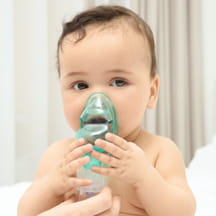For most parents, receiving a prescription from their child’s pediatrician likely requires a trip to the pharmacy. But for patients of OSF HealthCare Children's Hospital of Illinois, it may mean a visit to the local children's museum—thanks to the hospital’s Prescription for Play program.
A collaboration between the hospital and the Peoria PlayHouse Children's Museum, the program aims to help children develop cognitive abilities, gross and fine motor skills and social relationship management through play. The provider writes a prescription for play that includes a free or greatly reduced membership to the PlayHouse. Additionally, each program participant receives a play kit with more than 50 games and activities for families to engage with at home.
“Parents respect and listen to the advice of their pediatricians, so this program helps reinforce the message that unrestricted, imaginative play is something your doctor wants you to do,” says Elise Albers, MBA, M.P.H., manager of population health at OSF Children’s Hospital. “Having your pediatrician prescribe it just seems to make sense.”

Albers says research from a variety of sources, including the American Academy of Pediatrics (AAP), that underscores the importance of play in childhood development served as an impetus for the initiative. Although some pediatric health care providers already inquire about play during well-child visits, Albers and her team worked with registered play therapists to develop a screening tool practitioners can use as a guide to determine the need for a play prescription. Prescriptions are based on many factors, including the patient’s medical condition, mobility concerns, current time spent playing, and access to safe outdoor recreational areas
In addition to providing health benefits, play works to draw parents closer to their children. “We know that using play as a way to increase the bond between the child and parents is a really good thing, but nowadays with all the screen time and other kinds of things, a little of the art of play and interacting with your child has been lost,” says Kay Saving, M.D., director of medical services at OSF Children’s Hospital. “We can equip parents with simple play activities that help develop their child's mind, cognition and imagination while they’re also developing that bond.”
Advice for others
To date, OSF Children’s Hospital has written more than 200 play prescriptions to the PlayHouse and distributed more than 500 home play kits. The program’s success has led to the development of a similar program in a neighboring community, according to Albers.
Prescription for Play was made possible by the Toy Foundation Play Grant Program—a partnership between the Children's Hospital Association and the Toy Foundation, a nonprofit organization that works with the toy industry to provide play opportunities to children across the country. In all, 18 children’s hospitals received grants through the program in 2021 to make play more accessible with the goal of strengthening the overall development of children.
The grant was instrumental in subsidizing the PlayHouse memberships and play kits, but Albers says similar programs can be built elsewhere using available resources.
“A prescription for play program could be developed with a local park district—it's a great program and can look very different depending on where you are and what the community's needs are,” Albers says. “There are a lot of different directions you can go, and it can be a very exciting program to bring to your community.”


